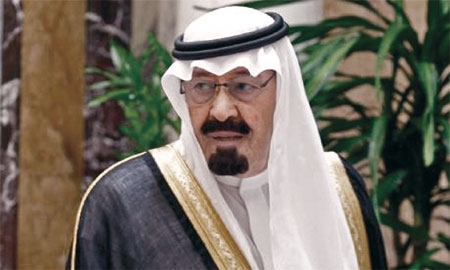In November, Forbes magazine once again ranked Custodian of the Two Holy Mosques King Abdullah bin Abdulaziz among the most powerful personalities in the world. In this year’s analysis, the King features in sixth place, behind Barack Obama, Vladimir Putin, Hu Jintao, Angela Merkel and Bill Gates. In reviewing candidates for its list of the World’s 70 Most Powerful People, Forbes takes four factors into account: how many people the individuals have power over; the financial resources controlled by each candidate; whether the nominee is influential in more than one arena or sphere; and finally consideration as to how actively the candidates wield their power.
With regard to King Abdullah, Forbes commented on his ongoing pursuance of moderate reform in conservative Saudi Arabia and his stance on various issues. For example, it lauded the King’s recent decision to allow women to run for office and vote in municipal elections, and that he has “consistently nudged the nation’s educational system out from under clerical control.” The magazine also noted that the King opposed the Arab Spring uprisings that swept across the region earlier this year and that he has spent more than $130 billion to fund social projects in the kingdom.
Born in Riyadh in 1924, the King spent years living in the desert with Bedouin tribes who instilled in him their values of honor, simplicity, generosity and bravery. He became the de facto ruler of the kingdom in 1996 when his half-brother, King Fahd, suffered a debilitating stroke, and positioned himself as a reformer with the desire to assist in the development of Saudi Arabia’s people. Making good on his promises of change, in the years following he pushed for reforms that included the nation’s first popular elections, which were held to choose local councils, and transferred control of the education of girls from religious authorities to the Ministry of Education.
“MAN COULD BE THE CAUSE OF THE DESTRUCTION OF THIS PLANET AND EVERYTHING IN IT. HE IS ALSO CAPABLE OF TURNING IT INTO AN OASIS OF PEACE AND TRANQUILITY IN WHICH ADHERENTS OF RELIGIONS, CREEDS AND PHILOSOPHIES COULD CO-EXIST, AND IN WHICH PEOPLE COULD COOPERATE WITH EACH OTHER IN A RESPECTFUL MANNER, AND ADDRESS PROBLEMS THROUGH DIALOGUE RATHER THAN VIOLENCE”
KING ABDULLAH BIN ABDULAZIZ
|
Since ascending to the throne in 2005, King Abdullah has continued to make good on his promises of development, making it a central focus of his reign and launching a range of major economic, social, education, health and infrastructure projects that have brought about remarkable changes throughout the kingdom. Among his most notable achievements include the creation of four economic cities: King Abdullah Economic City, Prince Abdulaziz bin Mousaed Economic City, Knowledge Economic City and Jazan Economic City. He has also approved a historic reorganization of Saudi Arabia’s judicial system and enacted laws to formalize royal succession, as well as announcing projects to expand the Two Holy Mosques and major welfare initiatives. A major cabinet reshuffle in 2009 replaced some senior conservative figures and brought in the country’s first female deputy minister.
In education, the King Abdullah Project for General Education Development launched in 2009 with $2.4 billion backing from the government and was designed to enhance general education levels from kindergarten to high school through intensive teacher training and better facilities. The King Abdullah University of Science and Technology (KAUST) also opened in 2009 with a $10-billion endowment to spark greater innovation in the kingdom and is the country’s first mixed-gender campus. In May this year the Princess Noura bint Abdulrahman University for Girls opened its doors to mark a milestone in Arab women’s education and is one of the largest centers of higher education for women in the world.
A strong advocate of constructive global cooperation, King Abdullah’s participation in international diplomacy reflects the kingdom’s position as a defender of Arab and Islamic issues and for the achievement of world peace, stability and security. He has sought out closer relations with the United States, viewed by many in the royal family as essential for national and regional security, and has taken a leading role in promoting dialogue among the world’s leading faiths, including a historic meeting with Pope Benedict XVI in 2007.
In his opening address at the 2008 World Conference on Dialogue in Madrid, Spain, King Abdullah said: “Man could be the cause of the destruction of this planet and everything in it. He is also capable of turning it into an oasis of peace and tranquility in which adherents of religions, creeds and philosophies could co-exist, and in which people could cooperate with each other in a respectful manner, and address problems through dialogue rather than violence.”

0 COMMENTS